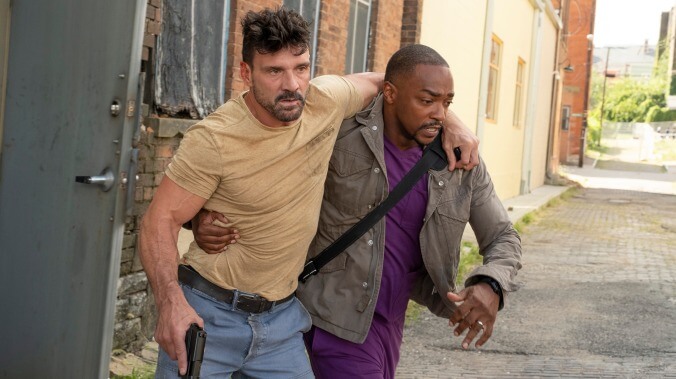Two Marvel alums race through the grating Netflix chase thriller Point Blank

The bullets are already flying by the time the gun-toting burglar Abe (Frank Grillo) tumbles into the opening shot of Point Blank, leaping from a mansion balcony to the strains of Black Flag’s hardcore anthem “Rise Above.” Exchanging shots with a couple of goons in ski masks, he runs, bleeding, through the rich-looking neighborhood, downhill to the intersection where he’s going to meet up with brother-slash-driver Mateo (Christian Cooke). And he’s almost in sight of the getaway car when a sedan comes through the intersection and sends Abe flying a good 10 feet to a thunk on the asphalt. Unfortunately, this abortive opening action scene is about as punk as Point Blank gets—unless, that is, one considers setting a chase thriller in Cincinnati to be a punk gesture.
At the hospital, the plot gears are grinding. Abe, still unconscious, is the prime suspect in the murder of the assistant DA, and the police have already found him. After one failed attempt at breaking his brother out, Mateo hatches a cockamamie plan. He follows home Abe’s nurse, Paul (Anthony Mackie), knocks him out, and abducts Paul’s nine-months-pregnant wife, Taryn (Teyonah Parris). All Paul has to do is break Abe out of the hospital and deliver him to his brother and he’ll let her go. But as is usually the case, there are complications. Abe, now awake and pumped full of painkillers, is in possession of one of those USB drives full of incriminating evidence that have become the default MacGuffins of our age. He’s got dirty cops after him, and there’s a drug kingpin out there who wants his head.
A remake of the 2010 French thriller of the same title (already remade once before, in South Korea, as The Target), Point Blank mostly runs on the fumes of its chase-movie formula. (It goes without saying, but none of these films are in any way related to John Boorman’s 1967 modernist neo-noir Point Blank.) Director Joe Lynch (Everly, Knights Of Badassdom) seems to be under the impression that he’s thumbing his nose at viewer expectations, but for the most part, we recognize the clichés. We know that Abe and Mateo aren’t really bad guys (apart from the kidnapping), just as we can spot the real villain a mile away. While the French Point Blank got mileage out of its slick urban thrills and The Target went for bombast, Lynch’s downmarket Americanization mostly shoots for film-school-dorm humor. It extends from jokes about a cannabis-leaf-shaped piñata and a movie-obsessed gangster named Big D all the way to the soundtrack, an ’80s-themed-dance-party playlist featuring the likes of Sigue Sigue Sputnik, Oran “Juice” Jones, and Grandmaster Flash And The Furious Five. Even to someone with largely fond memories of the days when every up-and-coming filmmaker wanted to be Quentin Tarantino (or, worse, Guy Ritchie), the stuff grates.
Which leaves the rapport between Mackie, a reliably likeable presence, and Grillo, a classic hoarse-voiced tough guy actor in an age when transcendent B-movie roles seem to be in short supply. Like the 2017 thriller Wheelman, Point Blank was produced for Netflix by Grillo and Joe Carnahan’s shared production company, WarParty Films. (Logo: A cannon firing a disco ball.) But though the two movies share surface similarities (both are chase thrillers that clock in at under 90 minutes and star Grillo as a con in a robbery gone wrong), Point Blank is a long ways away from Wheelman’s minimalism and genre gimmickry. Unlike that very literal star vehicle, which mostly took place inside a car driven by Grillo’s nameless character, this one feels one-size-fits-all—which is to say, it isn’t especially tailored to either of its stars. It just sort of hangs on them, getting more and more tattered as it goes along.